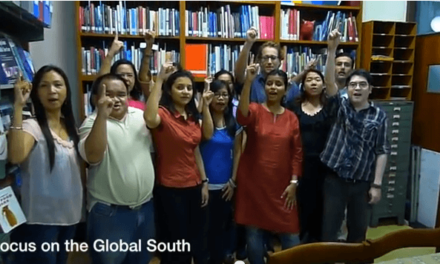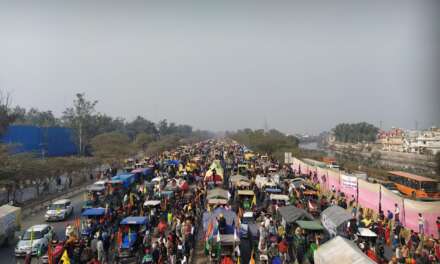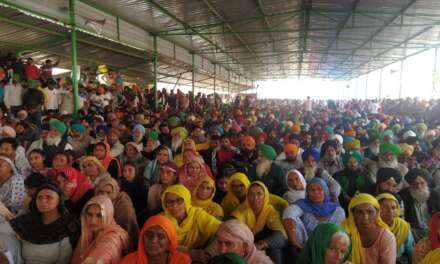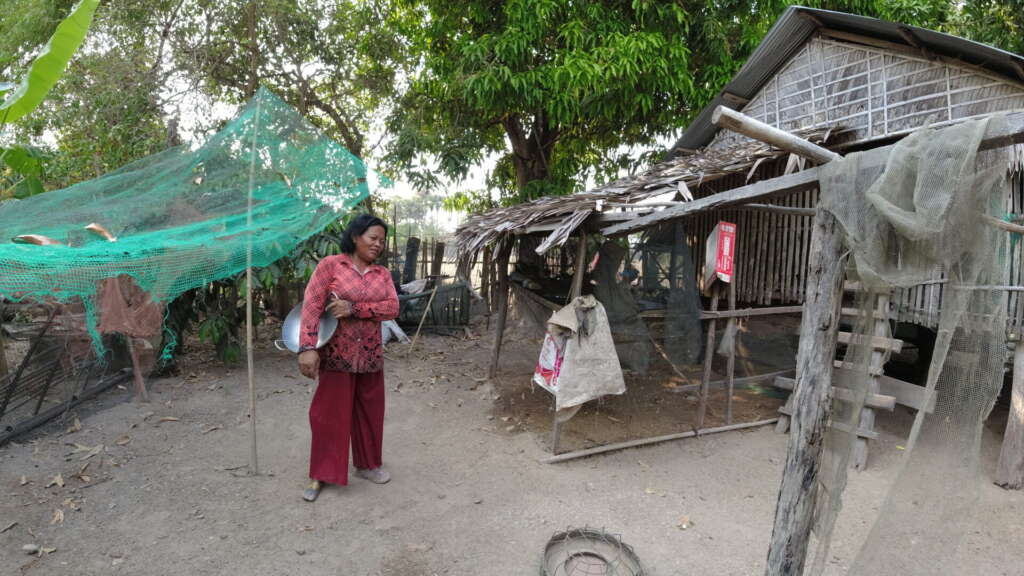
Ms. Yin Pon from Tang Trapeang Village, Pech Changvar Commune, Baribour District, Kampong Chhnang Province, Cambodia.
Voice of Ms. Yin Pon
Translation by: Ridan Sun, Focus on the Global South
“The COVID-19 pandemic has made it difficult for women to find work, as most women had to migrate to be employed as domestic helpers or find work at companies or garment factories. Women who are living in rural areas also face the same livelihood problems because they are unable to access the forest community to gather non-timber forest products as before. In addition, by the year 2021, animal husbandry and cultivation have become less productive, and it has made life more difficult for the people.
For people below the age of 40, they can still afford to go to work in a garment factory, but for those who are older, where can they go to find work? When women have lost the land, they will face many difficulties in life. For men, they are still able to find work outside as construction workers, or move across provinces to find a job. But for women in the community, when the forest is lost, they cannot find firewood for cooking and non-timber forest products for consumption. Also, women have to take care of the house and take care of the children so they can not go far away from home.
The loss of land is exacerbating the burden on women because they have no land to farm and no land to pass onto the younger generations. And when there is no forest community or natural resources available, they have indeed lost their traditional livelihoods to support their families. Nevertheless, we still do not despair because of our struggle, as some civil society institutions are supporting us to learn about agroecology to improve the livelihood from our family way of life.
As women, there is hope that people will have land for agriculture, animal husbandry, and a sustainable forest community for the next generation to have land to share, and have the opportunity to use it for the benefit of the community as well as for the benefit of society. In addition, it can make people in the community have a happy life – no migration, living together with family, no discrimination – and will give the next generation a chance to live peacefully.”
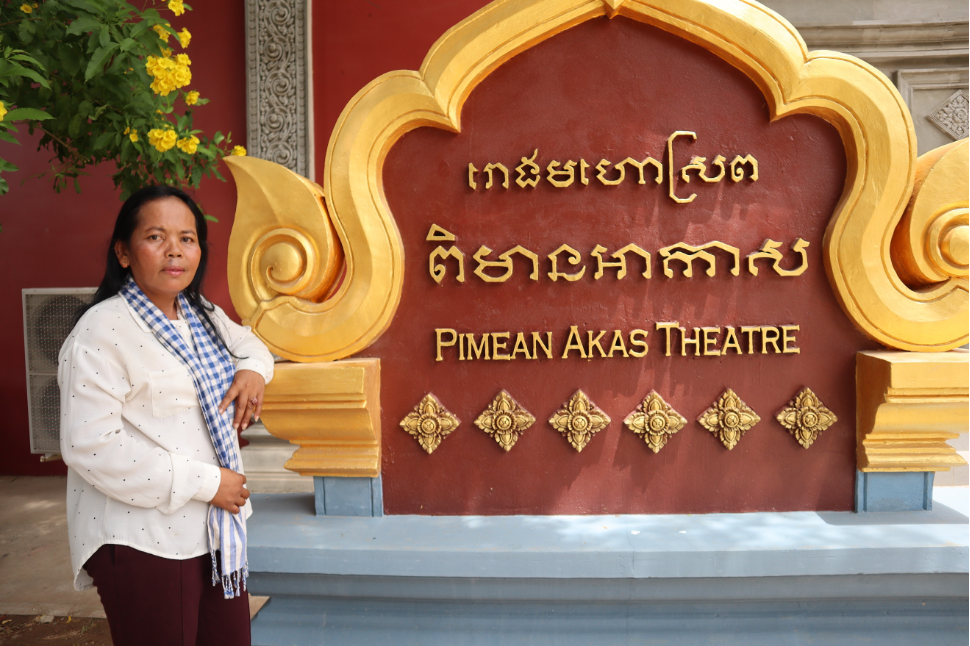
Ms. Om Sam Ath from Sala Krau District, Pailin Province, Cambodia.
Voice of Ms. Om Sam Ath
Translation by: Ridan Sun, Focus on the Global South
“For the local community, there used to be a negative view of women activists like me, saying that we were stubborn, we walked away from our husbands, walked away from our children. Now both men and women do not say much, but they are friendly to us. Sometimes when something happens, they always come to me for help.
There are a lot of problems or obstacles for women when participating in or leading such activities, such as fear because we can see electric shocks or other weapons when joining protests. There is also concern about leaving children, missing children who are at home and we do not know what they eat. This hurts us emotionally.
There are many methods for women activists to solve problems on the ground. We have to do something such as sending petitions from the village to the commune and then sending it to the national level. The strategy is thought to be effective. When we arrive in Phnom Penh, then we have to speak through the press or social media as much as possible. In the past, there had been many protests in Phnom Penh which had been conducted for a long time because a lot of problems had not been resolved for local communities.
I have the desire and want to see a change for myself, like living happily with family, getting a chance to travel and learn more, not just like a frog living in a well and just staying at home, cooking only breakfast, dinner, and sleep. I want to discover myself as a woman, not to be blamed for traveling outside while everyone could have a job to do. For the community, I also wish to resolve land legally, and do not want to see communities forced to migrate or have no choice to survive. I want to see the nation respect the rights of the people, not to be evicted, to be fair to each party.”
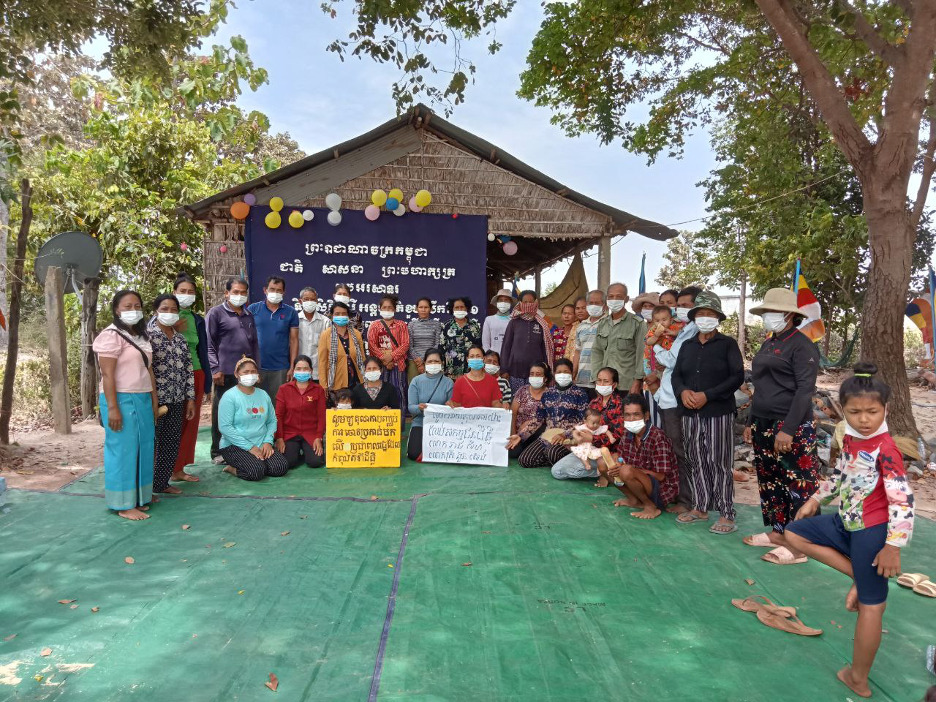
International Women’s Day at La Peang Community. Located at La Peang Village, Ta Ches Commune, Kampong Tralach District, Kampong Chhnang Province.
Voice of Mrs. Um Sophy
Translation by: Ridan Sun, Focus on the Global South
“COVID-19 left most women unemployed, causing them to lose their source of income and affecting their family life. Not only that, in such situations, women play more roles and suffer more than men. Personal health issues, family health issues, and the provision of online education for young children, such as buying a cell phone for their children to study online have become additional burdens for women.
For advocacy issues, due to poverty, some people have withdrawn from the grassroots movement and some of them no longer support our land reclamation, while others are accusing us of being too ignorant. The authorities are discriminating against us and the judiciary continues to charge us with incitement and social manipulation.
In relation to the perceptions of some people in society, it is thought that the women activists at the forefront are the ones who cause social insecurity, manipulating society against public officials, and even some factory workers think like that.
While in reality, women are more affected than men to survive because of the loss of land, forests, and natural resources, especially as a double whammy or dilemma caused by COVID-19. And women have been able to deal with the impact of the pandemic because women are more thoughtful than men in areas such as childcare, housework, and are capable of managing livelihood activities well.
As a woman, it is my hope and aspiration for my family, community, and society to let people know about land rights and we wish for natural resources such as land, forestland, rivers to stay sustainably. Hopefully, there will be a solution to the land issue, and it will make the family live happily, and reduce poverty in the community and society.”

